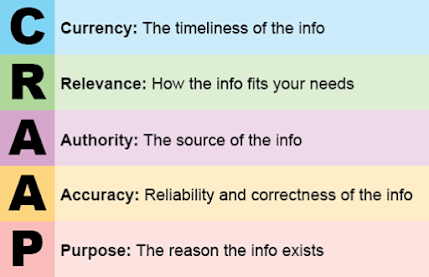Using Critical Digital Literacy Skills to Evaluate Online Information Related to the Internet Safety Topic of AI Overreliance
This week I've been putting my critical digital literacy skills to use by searching for information about an interest safety issue: AI Overreliance
I've been looking at AI overreliance which is basically when people make decisions in important real-world
contexts based on provided information by AI without verifying accuracy.
Source: https://shorturl.at/pVfhp
DEFINITION
AI overreliance refers
to a situation when people have the tendency to make decisions in important
real-world contexts by relying on information they found on Internet or by the
aid of AI rather than their own living experience or other factors.
WHY IT IS AN ISSUE?
Overreliance on
AI is an issue because it involves someone placing full trust in AI systems,
which can occasionally provide incorrect or unidentified information. This can lead to a type of decision-making
atrophy, where people are less capable to make independent choices.
Source: https://cybernews.com/editorial/humans-lose-skills-knowledge-ai/.
WHY IT IS SIGNIFICANT?
According to a report published by The New York Times
in 2020, a fatal crash happened due to driver’s heavy reliance on AI
driver-assistance system called Telsa’s Autopilot. This incident has raised
concerns about overreliance on AI in driving.
WHO IS AFFECTED? AND HOW DOES IT HAPPEN?
AI overreliance
can have a widespread and multifaceted impacts on human. As individuals, overly
relying on AI system can cause severe incidents when human cannot make their
own decisions in real-life situations. For example, some drivers using
semi-autonomous vehicles may become complacent, leading to accidents when the
AI fails to handle unexpected situations. Also, relying on AI for health
diagnostics or financial advice can lead to serious personal consequences. Some businesses, organizations or hospital put trust in AI for some cases also receive its impact when it provides inaccurate information.
CAUSES
Overreliance on
AI is primarily driven by the efficiency and convenience, as AI systems can
perform tasks faster and more accurately than humans. Additionally, AI has an
ability to process large data sets effectively. Moreover, AI systems can
overcome human limitations, such as errors and biases, making them an
attractive solution for businesses seeking to enhance productivity and
accuracy.
EFFECTS
AI overreliance
can have several significant effects. One major consequence is job
displacement, as automation of tasks traditionally performed by humans can lead
to job losses in various industries. Additionally, this dependence on AI can
destroy human skills, reduce critical thinking and problem-solving abilities as
people become less engaged in these tasks. Accountability becomes an issue, as
it can be difficult to determine responsibility for decisions made by AI
systems. Ethical concerns arise when AI makes decisions that may not adjust
with societal values. Moreover, AI overreliance can create vulnerabilities if
these systems fail or are compromised.
The article I have chosen
The video shows how I evaluate the article
Why I chose this method...
I choose the CRAAP method to evaluate this source because I feel it is applicable,
comprehensive and systematic. It is not only able to widely apply to a wide
range of sources, but it also helps me to cover multiple aspects of source evaluation.
By following the method, my process of evaluating the source becomes easier to
go through and more organized. The image below describes the method.
Link video: https://youtu.be/M2z8h1fLup8









Comments
Post a Comment